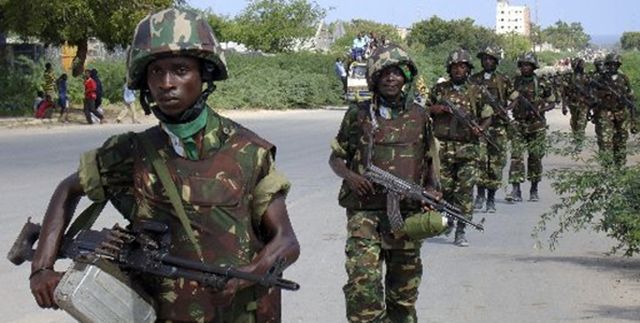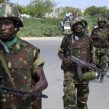
Al-Shabaab Threats Panic Kenya as Fighting Erupts on the Border with Somalia
Publication: Terrorism Monitor Volume: 9 Issue: 11
By:

Since the 1998 al-Qaeda attack on the U.S. Embassy in Nairobi and the 2002 attack on an Israeli-owned hotel and Israeli airliner in Mombasa, Kenya has considered Somalia a key security threat. To combat this threat, Kenya has tightened its border with Somalia and engaged in the training of troops for Somalia’s Transitional Federal Government (TFG). Kenyan president Mwai Kibaki said last year that the Somali Islamists had grown from a regional challenge to a global problem. [1]
Kibaki expressed the Kenyan government’s total commitment to working closely with Inter-Governmental Authority for Development (IGAD) member states, the African Union and the TFG in the search for a sustainable peace. This statement angered al-Shabaab, the Somali Islamist movement that is currently battling a combined African Union, TFG and Ethiopian offensive that has included battles along the Kenyan border (see Terrorism Monitor Brief, March 10). Ali Mohamud, a Somali-Kenyan political analyst based in Nairobi, said the president’s position was very clear: “Kenya must fight Islamists inside Somalia before they fight us in our land.” [2]
Kenya officially closed its border with Somalia (which divides ethnic Somali communities in north-eastern Kenya and southern Somalia) in January 2007 to prevent the entrance of Islamists. However, this has never stopped extremists from crossing into Kenya as refugees and then being smuggled further on into the Kenyan capital of Nairobi. Even after the border was closed, many former senior leaders of Somalia’s Islamic Courts Union (ICU) were commonly seen in places like Eastleigh, a district of Nairobi that is home to a large ethnic-Somali community.
On February 27, al- Shabaab threatened to attack Kenya for allowing Ethiopian and TFG forces to use its territory around the town of Mandera to launch a successful attack on the Somali town of Bulo Hawa, held by al-Shabaab. [3] Kenyan police reported arrests of suspected al-Shabaab members in a roundup in Eastleigh Estate and announced the names of other suspects being sought in a terrorist plot targeting Nairobi (The Standard [Nairobi], March 7; Nairobi Star, March 8).
While, the Kenyan government has maintained that it is not involved in the fights, residents suggest otherwise, claiming to have seen the Kenyan military providing logistical support to both the Ethiopians and Somali government forces, which were seen in the district headquarters, the customs office, the central police station, the prison and even patrolling the streets. [4]
On February 28, three members of parliament from Kenya’s North Eastern Province demanded the Kenyan military take action to expel Ethiopian troops that had reportedly taken over the town after local residents had fled. "The Ethiopian forces are firing missiles from Mandera into Somalia, thereby provoking al-Shabaab," said Mandera East MP Mohamed Hussein Ali. [5] On the same day, however, commissioner of the Kenya Police Mathew Kirai Iteere denied the presence of any foreign troops in Mandera. [6] A Nairobi daily reported that 600 TFG soldiers trained in Kenya had been moved up to Mandera in Kenyan military trucks in preparation for deployment into Somalia to link up with other TFG troops in Bulo Hawa (Daily Nation [February 27).
Although al-Shabaab has threatened Kenya many times, the threat is now real not only for those in Mandera but for the whole nation. In late February, al-Shabaab spokesman Shaykh Ali Mahmud Raage (a.k.a. Shaykh Ali Dheere) told reporters in Mogadishu:
"Kenya has long been working to undermine the existence of the Islamic sharia in Somalia… It has opened training camps inside [Somali] territories to train apostate Somali militants and also offered military bases to Ethiopian forces who are invading the neighboring Islamic region of Gedo. We shall no longer tolerate the constant aggression and ill acts of Kenya against our Muslim society. Kenya will bear responsibility for the consequences of the continuing aggression… Previous warnings to Kenya were nothing compared to this one; we are going to retaliate against [Kenya] harshly" (Daily Nation [Nairobi], February 28; AFP, February 28).
Kenya was again threatened on March 7 by al-Shabaab commander Mukhtar Robow “Ali Mansur” for Kenya’s alleged cooperation with Ethiopian and TFG troops (Shabelle Media Network, March 7; Suna Times, March 7).
Somali Islamists have carried out a number of attacks on Kenyan security personnel along the border. In the last instance, al-Shabaab fighters attacked officers of the General Service Unit (GSU) who were patrolling the Kenyan-Somali border region near Libio Post, 18 km west of the Somali border. One officer was seriously wounded in the ambush (al-Jazeera, July 21, 2010; Reuters, July 21, 2010).
Al-Shabaab’s threats have caused Kenyans to panic and are now condemning their government for putting their security at risk by allowing foreign troops to use Kenyan land as a launch pad for attacks on Islamist-held towns.
On February 28, Kenyan Police Commissioner Mathew Iteere said the threats by al-Shabaab could not be taken for granted, considering the movement had issued a similar warning to Uganda before the bombing of Kampala residents viewing last summer’s Soccer World Cup (see Terrorism Monitor Brief, July 16, 2010). Although he urged Kenyans not to panic, Iteere warned citizens to be extra careful while in social settings and transportation terminals (Kenya Broadcasting Corporation, February 28; Daily Nation [Nairobi], February 28).
The fact that al-Shabaab has recently lost a number of towns, including the border town of Bulo Hawa, does not mean that they should be underestimated. According to an international relations student from Mandera: “With the constant unemployment in the country, there are possibilities that a number of youth in the northern region could switch to join up with the al-Shabaab insurgency.” [7]
Al-Shabaab threats have forced Kenya’s government to increase security expenditures in the supplementary budget to be tabled in parliament in two weeks’ time. "I can’t give you a figure yet but the security budget has had to go up to make sure Kenya can secure itself," said permanent secretary of the treasury Joseph Kinyua (The Star [Nairobi], February 28). Considering the apparent ease with which the deadly Kampala bombings were carried out, there is a high probability that al-Shabaab could attempt a retaliatory attack within Kenya.
Notes:
1. Statement from Kenyan president Mwai Kibaki, July 30, 2010, Nairobi.
2. Author’s Interview with Somali-Kenyan political analyst Ali Mohamud, March 5, 2011, Nairobi.
3. Al-Shabaab spokesman, Press conference, February 27, 2011, Mogadishu.
4. Interviews with Mandera residents, February 27, 2011.
5. Interviews with North-Eastern Province MPs, February 28, 2011, Nairobi.
6. Interview with Kenya Police Commissioner Mathew Iteere, February 28, 2011, Nairobi.
7. Interview with Abdurahman Abdi, United States International University, March 8, 2011, Nairobi.





